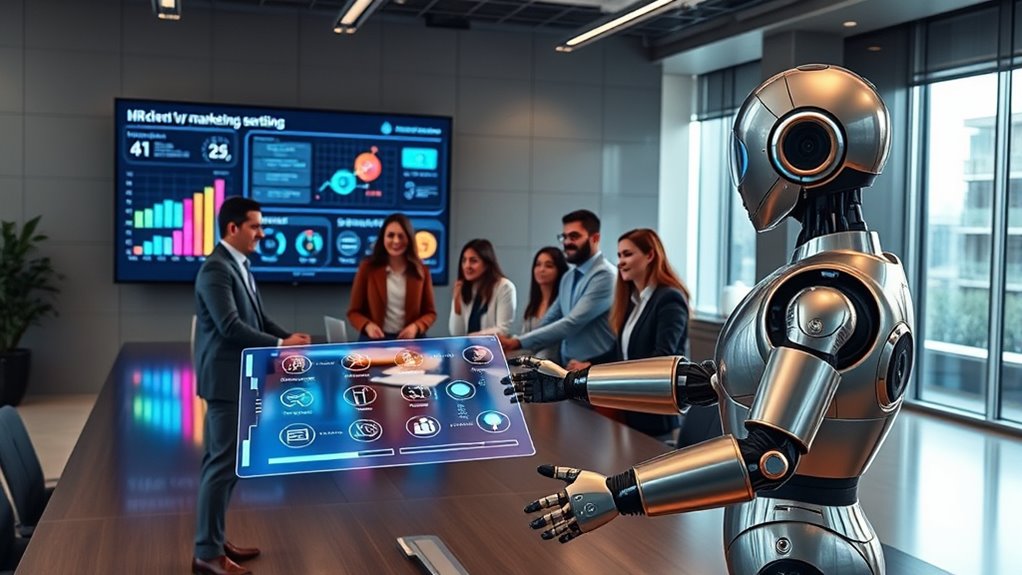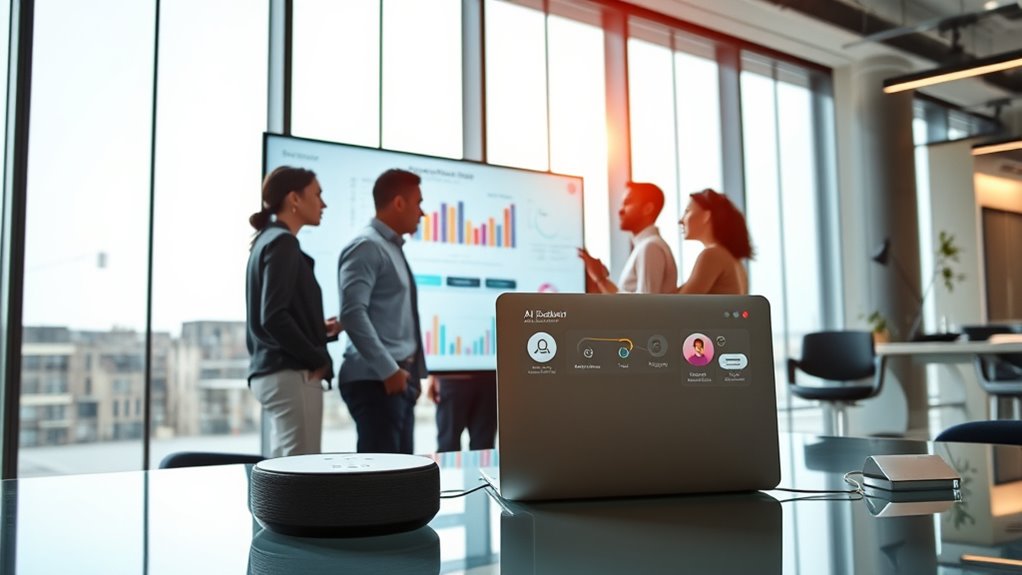Companies now use AI to streamline HR tasks like talent sourcing, screening, and personalized development, saving time and reducing bias. In marketing, AI automates content, targets personalized experiences, and boosts lead generation. Voice assistants engage customers effortlessly, while AI tools optimize workflows, increase productivity, and support industry-specific needs. Small and medium businesses are adopting AI for growth and automation. If you keep going, you’ll discover how these innovations can impact your own work.
Key Takeaways
- Companies use AI to automate HR functions like talent sourcing, screening, and personalized employee development, reducing hiring time and costs.
- AI enhances marketing through automated content creation, targeted campaigns, real-time personalization, and improved ROI.
- AI-driven tools facilitate workflow optimization by automating repetitive tasks, increasing productivity, and reducing errors across industries.
- Businesses leverage AI for industry-specific applications such as healthcare diagnostics, fraud detection, and retail recommendation engines.
- AI adoption is widely endorsed, with companies integrating advanced reasoning models and cloud solutions to drive innovation and competitive advantage.
The Growing Role of AI in Modern Workplaces

AI is transforming modern workplaces at an unprecedented pace, becoming an integral part of daily operations rather than just a futuristic concept. In 2024, 78% of organizations use AI, up from 55% last year, reflecting rapid adoption. It now streamlines tasks, boosts productivity, and supports decision-making across industries. Many companies see AI as a complementary tool, working alongside human workers instead of replacing them. Managers believe government regulations will encourage further AI integration, making it a strategic priority. However, awareness of AI’s presence varies, with 63% of workers reporting little to no AI use in their jobs. While AI adoption accelerates, some employees remain cautious, worried about job security, especially younger and lower-income workers. Overall, AI’s role continues to expand, reshaping how businesses operate daily. This rapid growth means that 20 million workers are expected to retrain in new careers or AI skills within the next few years, highlighting the importance of AI integration. Additionally, the adoption of AI-driven predictive modeling can help companies forecast future needs and optimize their human resources strategies. Furthermore, understanding the contrast ratio in AI-powered imaging tools can enhance the quality of visual outputs used in marketing and training materials. Emphasizing home improvement skills and knowledge can also be integrated into AI systems to better serve customer needs in that sector.
Transforming Human Resources With AI Technologies

You can see how AI is revolutionizing human resources by streamlining talent acquisition and personalizing employee development. Automated tools quickly filter applicants and identify skills gaps, saving time and boosting accuracy. As AI adoption grows, your HR strategies can become more efficient, data-driven, and tailored to individual needs. Automation may threaten 47% of jobs in the US, 35% in the UK, and 35% in Germany by 2030, highlighting the importance of reskilling initiatives to prepare the workforce for change. Additionally, integrating ethical hacking principles into cybersecurity strategies ensures that HR data remains protected against evolving cyber threats. The increased use of AI in Education also underscores the need for ethical and responsible AI implementation in workplace applications. Furthermore, advancements like the Snapdragon 8 Gen 3 demonstrate how on-device AI capabilities are enhancing mobile experiences, emphasizing the ongoing evolution of AI technologies across various sectors. The surge in cybersecurity vulnerabilities during incidents like the Microsoft Outage Impact highlights the critical need for robust security measures in AI-driven systems. Moreover, the integration of Email Marketing Tools with CRM systems can significantly boost targeted outreach and personalization efforts, making marketing campaigns more effective.
AI-Driven Talent Acquisition
As companies increasingly adopt AI technologies, talent acquisition is undergoing a significant transformation. You’ll find AI streamlining sourcing, screening, and engagement, making hiring faster and more data-driven. Predictive analytics forecast hiring needs, improving talent matching and preparation. AI reduces time-to-hire by up to 50% and cuts recruitment costs by 30%, boosting efficiency. AI-powered screening filters out 40% of applications before human review, easing administrative burdens. Advanced algorithms identify top candidates, while chatbots enhance communication and engagement. AI also promotes diversity by eliminating biases, increasing workforce diversity by 35%. By 2025, 60% of organizations will use AI for end-to-end recruitment, automating 40% of repetitive tasks and gaining a competitive edge. Research indicates that AI integration in HR not only improves efficiency but also enhances candidate experience, reshaping how you find, evaluate, and hire top talent. Additionally, recruitment platforms are becoming more sophisticated, providing deeper insights into candidate suitability and cultural fit. Incorporating bias mitigation techniques can further improve fairness and inclusivity in the hiring process.
Personalized Employee Development
Have you ever wondered how personalized employee development is revolutionizing HR? AI transforms training by tailoring learning experiences to individual needs, making skill gaps easier to address. Over 70% of employees believe generative AI tools help them learn new skills, boost creativity, and improve work quality. Using data-driven analytics, AI creates customized training programs and career paths, aligning development with each employee’s goals. It also supports continuous upskilling, with 89% of L&D professionals emphasizing proactive skill development. AI identifies workforce skill gaps, enabling targeted training and increasing employee satisfaction. Additionally, AI can incorporate advanced fraud detection techniques to enhance security measures in HR-related transactions and data management. This application of security measures ensures the integrity of sensitive information and builds trust within organizations. Moreover, integrating specialized tools like color care products can further support employee well-being and confidence, especially in roles requiring client interaction. Understanding diverse personality types allows AI-driven systems to better tailor coaching and development plans, leading to more effective engagement. Plus, AI-powered insights help develop personalized growth plans, fostering career advancement. This technology not only enhances skill building but also drives engagement by aligning individual aspirations with organizational needs. AI’s ability to automate cognitive functions surpasses traditional automation, enabling organizations to optimize talent management at scale.
Enhancing Marketing Strategies Through AI Automation

AI automation helps you streamline content creation, allowing you to produce more material faster and with less effort. It also enables you to personalize campaigns effectively, reaching your audience with tailored messaging. Additionally, AI can automate lead generation processes, freeing up your team to focus on strategic growth. Machine learning provides data insights to further refine marketing strategies and improve campaign performance. Understanding Vetted – ID Times can help you better optimize your website’s analytics and user engagement. Incorporating predictive analytics can help anticipate customer needs and optimize marketing efforts proactively. Implementing goal setting techniques can align your campaigns with overall business objectives and drive measurable results. Establishing a clear financial timeline can also help in aligning your marketing campaigns with fiscal planning and resource allocation.
Streamlining Content Creation
Leveraging AI automation has revolutionized content creation by enabling marketing teams to produce high-quality material more quickly and efficiently. With 85% of marketers using AI tools for content, you can generate content faster—93% of users say AI speeds up workflows. Small businesses leverage AI for SEO and marketing, while 42% of media leaders outsource writing tasks to AI, saving valuable time. AI helps save at least an hour on creative tasks for 86% of marketers and accelerates decision-making for 90%. It enhances content quality, with 78% reporting improvements, and boosts ROI in 68% of companies. Additionally, AI enables the creation of targeted content clusters, which improve relevance and authority in specific niches. Utilizing content management tools powered by AI further streamlines the scheduling and distribution process, maximizing outreach and engagement. Incorporating sound healing science principles can also inspire innovative content themes that resonate deeply with audiences seeking holistic wellness, similar to the way nutritional advantages of green juice promote health. Recognizing the importance of aligning content with authentic farmhouse decor can also deepen audience engagement and trust.
Personalizing Campaigns Effectively
Personalizing marketing campaigns has become essential for building stronger customer relationships and driving revenue growth. AI helps you analyze customer data in real-time, enabling tailored interactions that match individual preferences and behaviors. With AI, you can deliver consistent, cross-channel personalization—whether through emails, social media, or website experiences—ensuring your message resonates at every touchpoint. AI-powered tools adapt dynamically, responding to changing customer actions and timing, which keeps engagement relevant. Additionally, 73% of marketers agree AI plays a key role in creating these personalized experiences. As AI adoption rises—projected market growth to $217.33 billion by 2034—you gain a competitive edge by offering more relevant, timely campaigns that increase customer loyalty and exceed revenue goals.
Automating Lead Generation
Building on the power of personalized campaigns, automating lead generation takes your marketing efforts to the next level by streamlining how you identify and engage potential customers. AI tools automatically research leads, enrich data, and predict their likelihood to convert, saving you up to 60% of manual work. With AI-driven lead scoring, companies see a 51% increase in lead-to-deal conversions, boosting your sales pipeline. These tools enable personalized messaging at scale, increasing engagement and optimizing your marketing strategies. As the market grows, with projections reaching $15.55 billion by 2031, AI also helps you scale efficiently—generating around 1,877 leads per month—while improving ROI. Embracing AI in lead generation means more high-quality prospects and smarter decision-making, keeping you ahead in competitive markets.
The Rise of Voice Assistants in Consumer Engagement

Voice assistants are transforming how consumers interact with brands by making engagement more convenient and immediate. Over half of people keep voice-activated speakers in their living rooms, and 93% are satisfied with their voice assistants. Half of consumers have made purchases using voice, with most shopping for small, practical items. Younger generations like Gen Z (57%) and Millennials (56%) actively use these tools. When researching products, 71% turn to voice assistants first, and nearly 80% of voice shoppers report satisfaction. Many find the experience so seamless that 39% recommend it to friends and family. Voice assistants prioritize privacy at home, making them a trusted, integral part of daily consumer behavior. This shift is redefining how brands connect and engage with their audiences.
Boosting Productivity With Ai-Driven Workflow Tools

AI-driven workflow tools are revolutionizing how businesses operate by boosting productivity and streamlining processes. With 94% of employees familiar with generative AI and 99% of C-suite leaders endorsing AI, adoption continues to grow. Many organizations plan to increase investments in AI automation over the next three years, recognizing its role in operational efficiency. These tools automate repetitive tasks, reducing manual errors and speeding up project timelines. As a result, workforce productivity could increase by up to 40% over the next decade. Automating routine activities frees you to focus on strategic work, while real-time updates improve team collaboration. Additionally, AI enhances customer satisfaction through faster responses and lowers operational costs, giving your business a clear competitive edge.
Industry-Specific Applications of AI Agents

Industry-specific applications of AI agents are transforming how organizations operate across sectors by automating complex tasks and enhancing decision-making. In healthcare, AI automates 89% of clinical documentation, boosting productivity, while virtual nurse agents like Sensely monitor patients remotely, reducing hospital visits. Diagnostic AI supports faster, more accurate disease detection, cutting errors by up to 50%. Appointment scheduling AI improves patient flow, used in over half of deployments, and medical records AI enhances data accuracy and access. In finance, AI detects fraud with 40% higher accuracy and streamlines risk assessments. Retail relies on recommendation engines driving 35% of online sales and inventory management AI reduces stock issues. Manufacturing uses AI to automate nearly half of processes, improving speed and quality. These sector-specific AI applications are reshaping operational efficiency and service delivery.
How Small and Medium Businesses Are Leveraging AI

Small and medium-sized businesses are increasingly harnessing AI to streamline operations and stay competitive. About 75% are experimenting with AI, and 83% of growing firms lead in adoption. AI helps boost revenue—91% of SMBs using it report increased earnings—and nearly 80% believe it will be a game-changer. Many have adopted AI in some capacity; 77% of small businesses have integrated it into their operations. They use AI to automate routine tasks, improve productivity, and make data-driven decisions. In marketing, nearly half rely on AI for ad targeting, and content creation is common. Customer service benefits as well, with 72% of businesses experiencing faster resolutions. Despite challenges like data privacy and skill gaps, SMBs see AI as essential to future growth and competitive advantage.
Future Trends in AI Adoption Across Sectors

As AI adoption accelerates globally, different sectors are increasingly investing in and integrating these technologies to enhance their operations. You’ll see industries like healthcare, finance, media, telecom, manufacturing, and retail leading the charge, spending profoundly on AI. Large enterprises, especially those with 1,000+ employees, are already adopting AI at higher rates, with over 50% of big US companies using AI. Looking ahead, expect these trends:
- Sectors expanding AI investments, with plans to increase spending between 2025 and 2027.
- Cloud migration becoming essential for scalable AI deployment across industries.
- Development of advanced AI models focusing on reasoning and frontier capabilities.
- AI’s influence growing in operational efficiency, workforce automation, and customer experience.
These trends signal a future where AI becomes a core driver of innovation and growth across sectors.
Frequently Asked Questions
How Secure Is AI Data Handling in Corporate Environments?
You’re right to wonder about AI data security in companies. While AI offers strong threat detection and monitoring, many tools are high or critical risk, especially with 83.8% of data flowing to unsecured platforms. Employee misuse and unauthorized apps increase vulnerabilities. To stay safe, companies focus on preventing sensitive uploads, logging activities, and blocking unauthorized access, but the rapid AI growth still outpaces security measures, making data handling somewhat risky.
What Are the Ethical Considerations for AI in HR Practices?
When considering AI in HR practices, you need to prioritize ethics by avoiding biases that could unfairly disadvantage certain groups. You should guarantee transparency about how AI makes decisions and involve human oversight to intervene when necessary. Protect employee privacy by implementing strong data safeguards and openly communicating monitoring practices. Regularly auditing algorithms and staying compliant with evolving regulations helps maintain fairness and trust, ultimately fostering an ethical workplace environment.
How Do AI Tools Integrate With Existing Business Software Systems?
You might think AI integration disrupts current workflows, but actually, it seamlessly embeds into existing business systems. By using APIs, AI connects with platforms like ERP, CRM, and HCM, automating routine tasks and providing real-time insights. This enhances decision-making, boosts efficiency, and maintains user experience. You’ll find AI custom-built or off-the-shelf solutions that align with your infrastructure, ensuring smooth adoption without causing major upheavals.
What Training Is Needed for Employees to Effectively Use AI Assistants?
To effectively use AI assistants, you need targeted training. Focus on developing your data literacy to interpret AI outputs, learn basic programming and AI concepts, and master prompt crafting. Enhance soft skills like communication, collaboration, and adaptability. Participate in workshops, online courses, and hands-on experiences to build confidence. Regular feedback and mentorship will keep your skills sharp, ensuring you can leverage AI tools confidently and ethically in your work.
How Cost-Effective Is AI Implementation for Small Businesses?
You see AI as an investment, a gamble, a leap toward growth. Its cost-effectiveness depends on balancing initial expenses—$5,000 to $30,000—and ongoing costs—$1,000 to $5,000 monthly—against benefits like increased productivity, streamlined operations, and competitive edge. When managed well, AI can turn expenses into savings, making your small business more efficient and resilient. Yet, it requires careful planning to guarantee the long-term value outweighs the upfront costs.
Conclusion
As you explore AI’s potential, imagine streamlining your HR processes or boosting marketing campaigns effortlessly. For instance, a small retailer using AI chatbots increased customer engagement and sales without extra staff. Embracing these technologies now can give you a competitive edge, making your business smarter and more responsive. Don’t wait—integrate AI solutions today to transform your operations and stay ahead in a rapidly evolving digital world.









